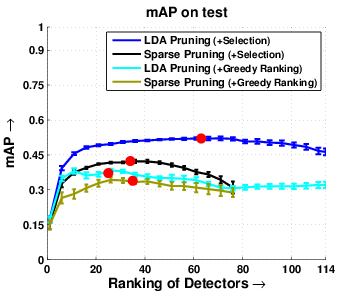Data Driven Exemplar Model Selection
| We start with a large set of images and
remove redundancy to select a compact set of exemplars
(highlighted in red). Our selection also provides a ranking so
that the resulting set can be used in budgeted detection/anytime
scenarios. Our results show that this selection is doubly
vital - gives computational speedup, and improves
performance as compared to using the entire set. Using all 1684
Exemplar-SVMs gives 0.311 mAP. Our compaction method selects
only 62 Exemplar-SVMs (without training all of them) with
0.52 mAP. Less is indeed more!
(see Results) |
People
Ishan Misra
Abhinav Shrivastava
Martial Hebert
Overview
We consider the problem of discovering discriminative exemplars
suitable for object detection. Due to the diversity in appearance in
real world objects, an object detector must capture variations in
scale, viewpoint, illumination etc. The current approaches do this by
using mixtures of models, where each mixture is designed to capture
one (or a few) axis of variation. Current methods usually rely on
heuristics to capture these variations; however, it is unclear which
axes of variation exist and are relevant to a particular task. Another
issue is that we require a large set of training images to capture
such variations. Current methods do not scale to large training sets
either because of training time complexity or test time complexity. In
this work, we explore the idea of compactly capturing task-appropriate
variation from the data itself. We propose a two stage data-driven
process, which selects and learns a compact set of exemplar
models for object detection. These selected models have an inherent
ranking, which can be used for anytime/budgeted detection
scenarios. Another benefit of our approach (beyond the computational
speedup) is that the selected set of exemplar models performs better
than the entire set.

|
Some Results

|

|
|
The ranking provided by our algorithm as compared to that of Sparse
Modeling (Elhamifar et al., 2012) on the KITTI car dataset.
|
Our Method (LDA Pruning+Selection) against baselines.
|
Paper
Acknowledgement
This work was supported in part by NSF Grant IIS1065336 and the Siebel Scholarship.
Copyright notice




